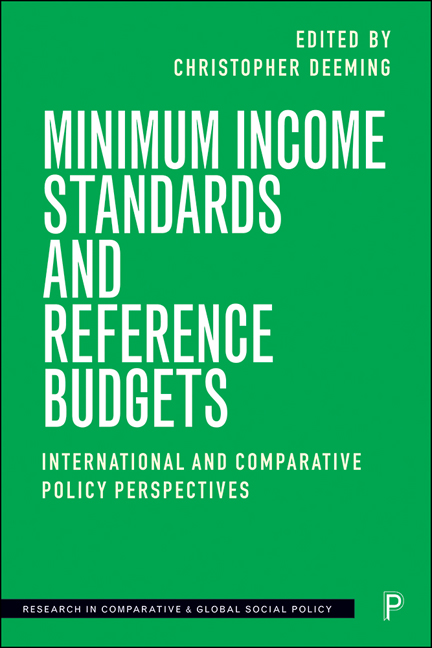21 - Establishing a National Standard: the Role of the UK’s Minimum Income Standard in Policy and Practice
Published online by Cambridge University Press: 12 March 2021
Summary
Introduction
Since 2008, research on the Minimum Income Standard (MIS) has been used to calculate and publish annual minimum budgets for different household types in the United Kingdom. This work has been funded by the Joseph Rowntree Foundation (JRF) with the purpose of having an evidence-based benchmark of what income people in the UK require in order to meet their material needs and participate in society. Such a benchmark has both analytical and practical purposes. Analytically, it produces a tool for monitoring the extent of low income, based on an empirically grounded benchmark, regularly updated to keep up with changes in costs and changes in society. At a practical level, it is being used in a wide range of contexts, most notably as a reference point in setting pay, in prioritising charitable assistance, in defending the right to access justice and, most recently, in setting a government target (the reduction of fuel poverty in Scotland).
This chapter describes how MIS has evolved as a standard for policy and practice in the UK. It starts by considering the origins and characteristics of MIS, from the perspective of what is meant by setting a ‘standard’ and how MIS seeks to fulfil this role. It then presents four ways in which MIS is being used. The chapter concludes by reflecting on how MIS has evolved as a standard in the UK, which may help inform efforts in other countries to develop such standards.
Origins and characteristics of MIS as a standard
The notion of having ‘standards’ in relation to income has parallels with the way we conceive of standards in education, health and other areas in which we desire a certain minimum. For example, in publishing educational attainment data, the government reports how many children are attaining an ‘expected standard’ in core subjects at certain ages (e.g. Department for Education, 2018). The benefits of attaining such standards are partly seen as being good for society (having a literate population), and partly linked to the idea of individual social ‘rights’. Adequate living standards figure prominently in the UN's Universal Declaration of Human Rights, whose Article 25 states that: ‘Everyone has the right to a standard of living adequate for the health and well-being of himself and of his family.
- Type
- Chapter
- Information
- Minimum Income Standards and Reference BudgetsInternational and Comparative Policy Perspectives, pp. 307 - 318Publisher: Bristol University PressPrint publication year: 2020



